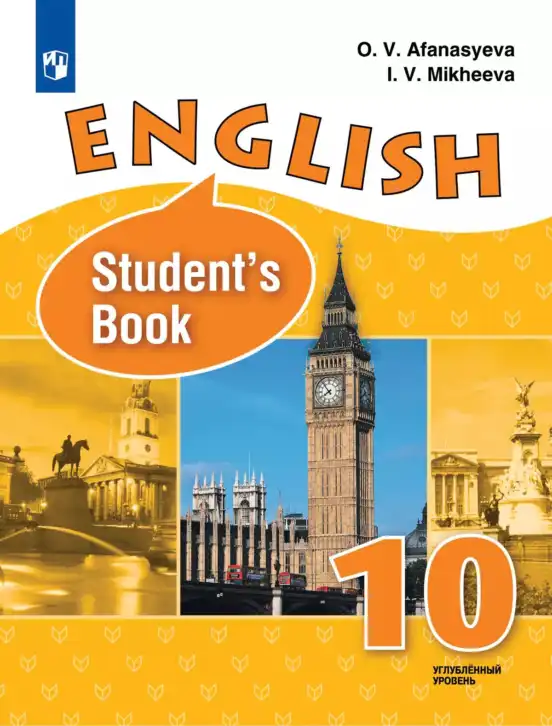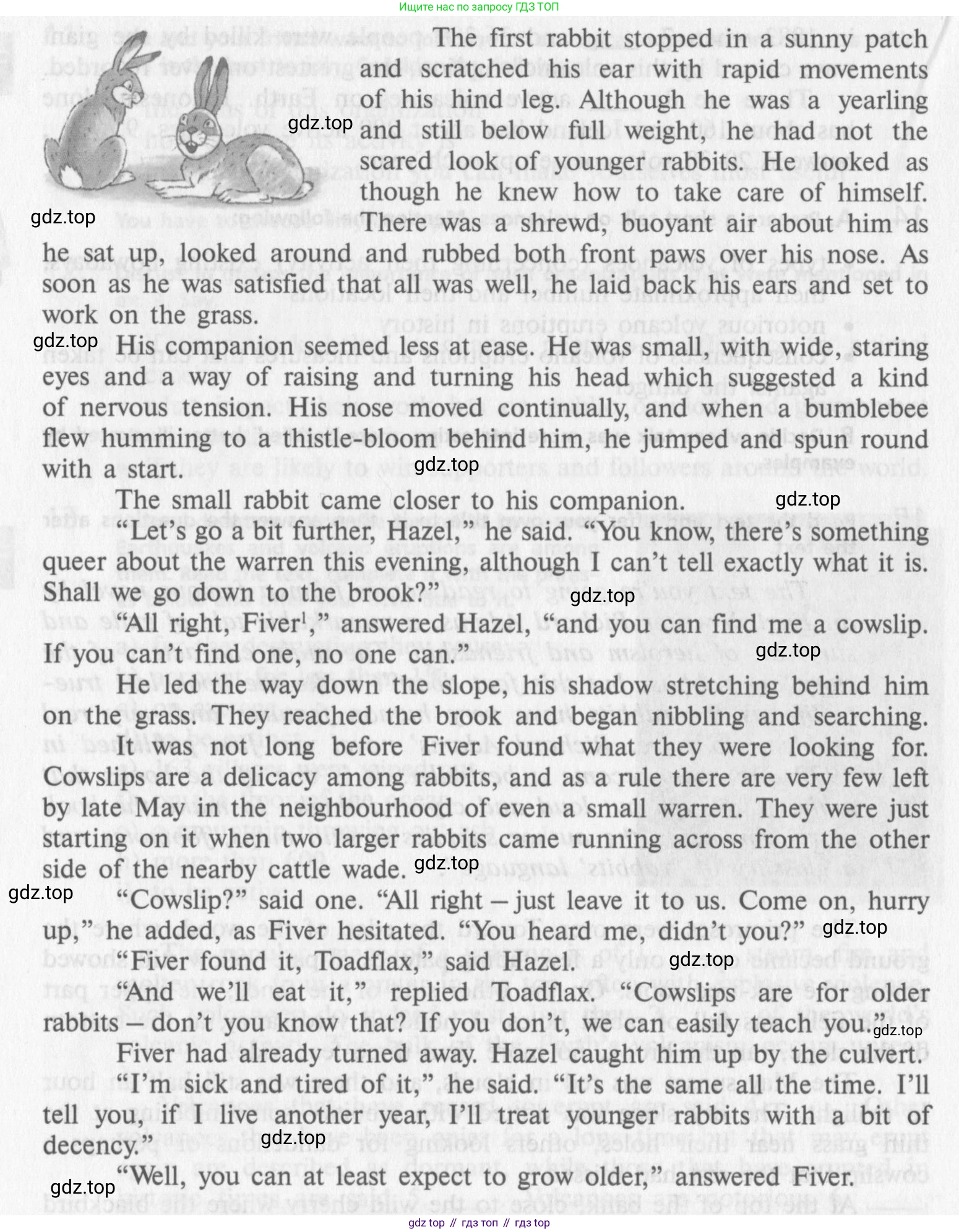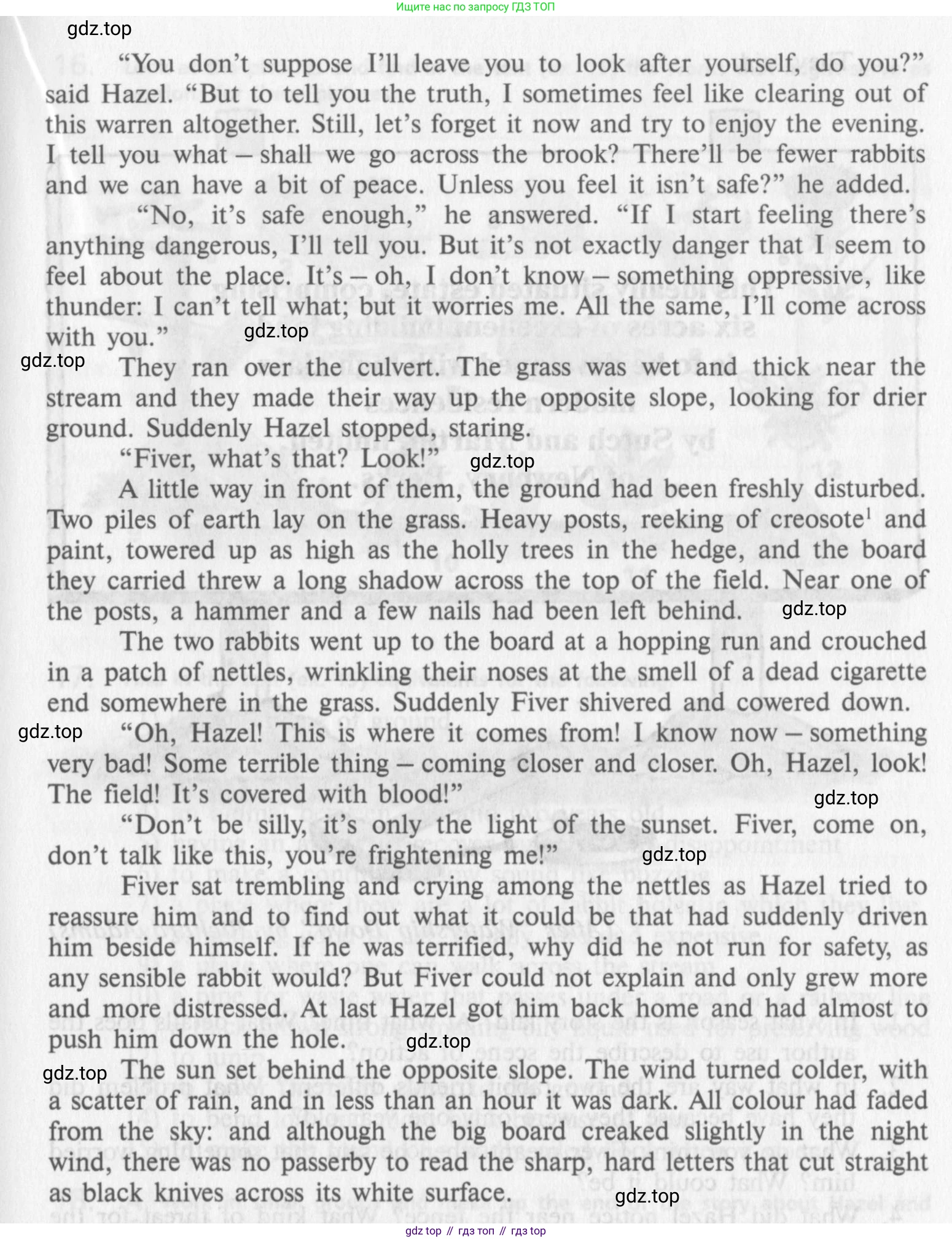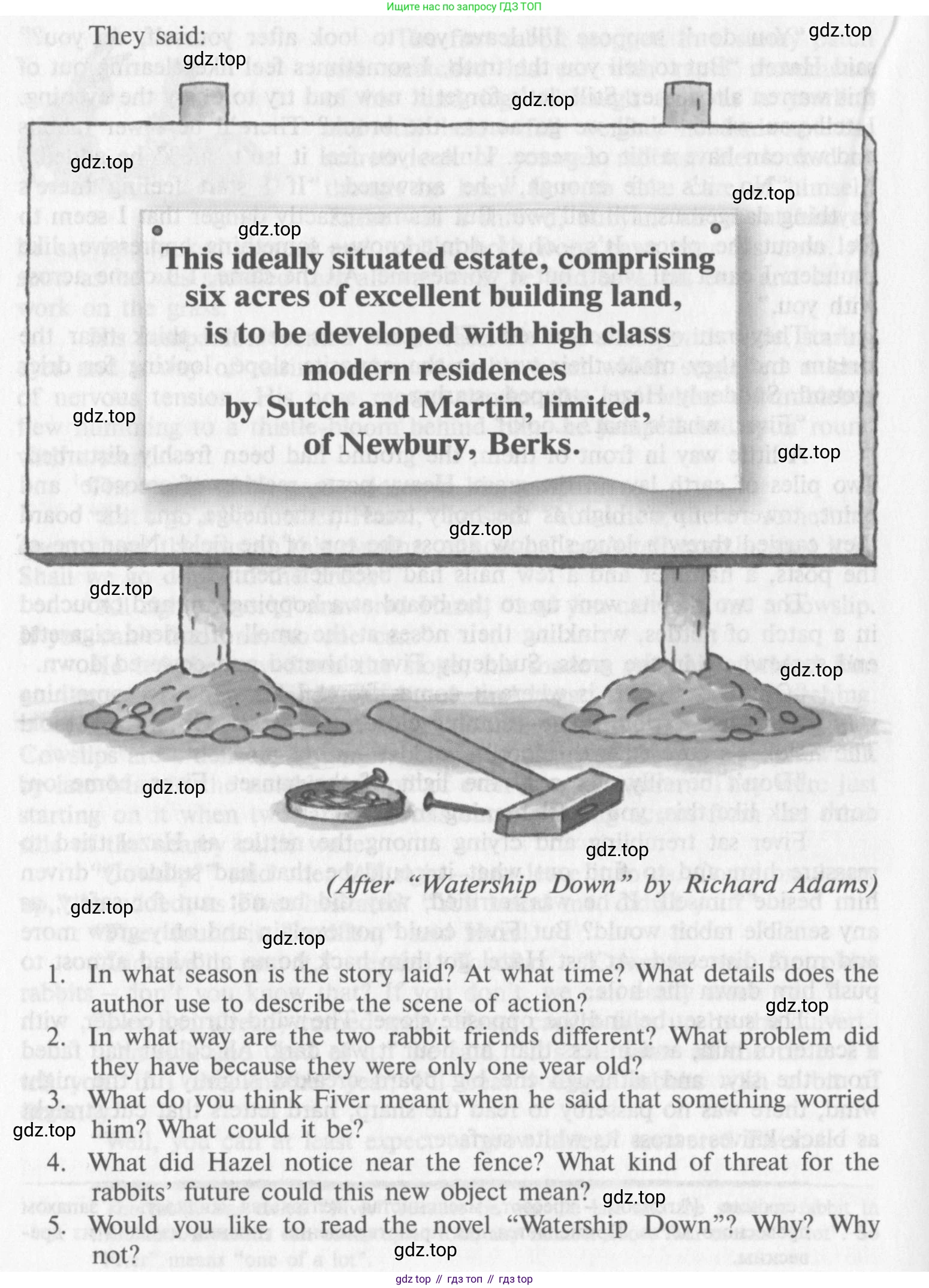Номер 15, страница 109 - гдз по английскому языку 10 класс учебник Афанасьева, Михеева

Авторы: Афанасьева О. В., Михеева И. В.
Тип: Student's book (Учебник)
Издательство: Просвещение
Год издания: 2014 - 2026
Уровень обучения: углублённый
Цвет обложки: белый, оранжевый с Биг Беном
ISBN: 978-5-09-027690-0
Популярные ГДЗ в 10 классе
Unit 3. Man — the Child of Nature. Reading - номер 15, страница 109.
№15 (с. 109)
Условие. №15 (с. 109)
скриншот условия




15. Read the text and offer your own title to it, then answer the questions after the text.
The text you're going to read comes from a famous novel by an English writer Richard Adams, a remarkable tale of exile and survival, of heroism and friendship. The main characters of the story are rabbits, but this fact doesn't make the book less true-to-life as the rabbits have very human features and very real problems to solve. Richard Adams' novel was first published in 1972 and soon became a bestseller. It is one of the books that make you laugh out loud and cry and think. To make the book more convincing the author supplies it with maps, footnotes and a glossary of "rabbits' language".
The primroses were over. Toward the edge of the wood, where the ground became open, only a few fading patches of pale yellow still showed among the oak-tree roots. On the other side of the fence, the upper part of the field was full of rabbit holes. A hundred yards away, at the bottom of the slope, ran the brook, no more than three feet wide.
The May sunset was red in clouds, and there was still half an hour to twilight. The dry slope was dotted with rabbits – some nibbling at the thin grass near their holes, others looking for dandelions or perhaps a cowslip that the rest had missed.
At the top of the bank, close to the wild cherry where the blackbird sang, two rabbits were sitting side by side. Soon, the larger of the two came out of the bushes and ran up into the field. A few moments later the other followed.
The first rabbit stopped in a sunny patch and scratched his ear with rapid movements of his hind leg. Although he was a yearling below full weight, he had not the sleek look of younger rabbits. He looked as though he knew how to take care of himself. There was a shrewd, buoyant air about him as he sat up, looked around and rubbed both front paws over his nose. As soon as he was satisfied that all was well, he laid back his ears and set to work on the grass.
His companion seemed less at ease. He was small, with wide, staring eyes and a way of raising and turning his head which suggested a kind of nervous tension. His nose moved continually, and when a bumblebee flew humming to a thistle-bloom behind him, he jumped and spun round with a start.
The small rabbit came closer to his companion.
“You know, there's something queer about the warren this evening, although I can't tell exactly what it is. Shall we go down to the brook?”
“All right, Fiver,” answered Hazel, “and you can find me a cowslip. If you can't find one, no one can.”
He led the way down the slope, his shadow stretching behind him on the grass. They reached the brook and began nibbling and searching.
It was not long before Fiver found what they were looking for. Cowslips are a delicacy among rabbits, and as a rule there are very few left by late May in the neighbourhood of even a small warren. They were just starting on it when two larger rabbits came running across from the other side of the nearby cattle wade.
“Just leave it to us. Come on, hurry up,” he added, as Fiver hesitated. “You heard me, didn't you?”
“Cowslip?” said one. “All right, Hazel.”
“Fiver found it, Toadflax,” said Hazel. “Cowslips are for older rabbits – don't you know that? If you don't, we can easily teach you.”
Fiver had already turned away.
“I'm sick and tired of it,” he said. “It's the same all the time. I'll tell you, if I live another year, I'll treat younger rabbits with a bit of decency.”
“Well, you can at least expect to grow older,” answered Fiver.
“You don't suppose I'll leave you to look after yourself, do you?” said Hazel. “But to tell you the truth, I sometimes feel like clearing out of this warren altogether. Still, let's forget it now and try to enjoy the evening. I tell you what – shall we go across the brook? There'll be fewer rabbits and we can have a bit of peace. Unless you feel it isn't safe?” he added.
“No, it's safe enough,” he answered. “If I start feeling there's anything dangerous, I'll tell you. But it's not exactly danger that I seem to feel about the place. It's – oh, I don't know – something oppressive, like thunder: I can't tell what; but it worries me. All the same, I'll come across with you.”
They ran over the culvert. The grass was wet and thick near the stream and they made their way up the opposite slope, looking for drier ground.
Suddenly Hazel stopped, staring.
“Fiver, what's that? Look!”
A little way in front of them, the ground had been freshly disturbed. Two piles of earth lay on the grass. Heavy posts, reeking of creosote1 and ugly trees in the hedge, and the board they carried threw a long shadow across the top of the field. Near one of the posts, a hammer and a few nails had been left behind.
The two rabbits went up to the board at a hopping run and crouched in a patch of nettles, wrinkling their noses at the smell of a dead cigarette end somewhere in the grass. Suddenly Fiver shivered and cowered down.
“Oh, Hazel! This is where it comes from! I know now – something very bad! Some terrible thing – coming closer and closer. Oh, Hazel, look! The field! It's covered with blood!”
“Don't be silly, it's only the light of the sunset. Fiver, come on, don't talk like this, you're frightening me!”
Fiver sat trembling and crying among the nettles as Hazel tried to reassure him and to find out what it could be that had suddenly driven him beside himself. If he was terrified, why did he not run for safety, as any sensible rabbit would? But Fiver could not explain and only grew more and more distressed. At last Hazel got him back home and had almost to push him down the hole.
The sun set behind the opposite slope. The wind turned colder, with a scatter of rain, and in less than an hour it was dark. All colour had faded from the sky: and although the big board creaked slightly in the night wind, there was no passerby to read the sharp, hard letters that cut straight as black knives across its white surface.
They said:
This ideally situated estate, comprising six acres of excellent building land, is to be developed with high class modern residences by Sutch and Martin, limited, of Newbury, Berks.
(After “Watership Down” by Richard Adams)
1. In what season is the story laid? At what time? What details does the author use to describe the scene and atmosphere of action?
2. In what way are the two rabbit friends different? What problem did they have because they were only one year old?
3. What do you think Fiver meant when he said that something worried him? What could it be?
4. What did Hazel notice near the fence? What kind of threat for the rabbits’ future could this new object mean?
5. Would you like to read the novel “Watership Down”? Why? Why not?
Решение. №15 (с. 109)

Решение 2. №15 (с. 109)
1. В какое время года происходит действие рассказа? В какое время суток? Какие детали использует автор для описания места действия?
Ответ: The story is set in late spring, in May, during the evening at sunset. The author describes the scene using details like "The primroses were over", "fading patches of pale yellow", "The May sunset was red in clouds", and rabbits nibbling grass and looking for dandelions and cowslips. / Действие рассказа происходит поздней весной, в мае, вечером на закате. Автор описывает место действия, используя такие детали, как «первоцветы отцвели», «увядающие бледно-желтые пятна», «майский закат был красным в облаках» и кролики, щиплющие траву и ищущие одуванчики и первоцветы.
2. Чем отличаются два друга-кролика? Какая проблема у них возникла из-за того, что им был всего один год?
Ответ: Hazel is larger, looks confident and self-assured. Fiver is small, nervous, and intuitive. The problem they faced as yearlings was being bullied by two older, larger rabbits who took their cowslip, stating that "Cowslips are for older rabbits". / Орех крупнее, выглядит уверенным в себе. Пятик маленький, нервный и обладает хорошей интуицией. Проблема, с которой они столкнулись, будучи годовалыми, заключалась в том, что два более старых и крупных кролика издевались над ними и забрали их первоцвет, заявив, что «первоцветы для старших кроликов».
3. Как вы думаете, что имел в виду Пятик, когда сказал, что его что-то беспокоит? Что это могло быть?
Ответ: Fiver meant that he sensed a great, oppressive danger that he couldn't initially explain, comparing it to "something oppressive, like thunder". This feeling was a premonition of the destruction of their warren. The danger was the arrival of humans who were going to build houses on their land. / Пятик имел в виду, что он чувствовал большую, гнетущую опасность, которую сначала не мог объяснить, сравнивая её с «чем-то гнетущим, как гром». Это чувство было предчувствием уничтожения их кроличьего городка. Опасность заключалась в приходе людей, которые собирались строить дома на их земле.
4. Что заметил Орех возле забора? Какую угрозу для будущего кроликов мог означать этот новый объект?
Ответ: Hazel noticed two piles of earth, heavy posts, and a board that smelled of creosote and paint. This object, a sign, meant a terrible threat: their home was going to be destroyed to build "high class modern residences" for humans. / Орех заметил две кучи земли, тяжелые столбы и доску, пахнущую креозотом и краской. Этот объект, вывеска, означал ужасную угрозу: их дом собирались уничтожить, чтобы построить «высококлассные современные резиденции» для людей.
5. Хотели бы вы прочитать роман «Обитатели холмов»? Почему да? Почему нет?
Ответ: Yes, I would love to read this novel. The excerpt is very intriguing and full of suspense. I enjoy adventure stories, especially about animals that have their own society and problems. It seems like an exciting story about courage and fighting for one's home. / Да, я бы с удовольствием прочитал этот роман. Отрывок очень интригующий и полон напряжения. Мне нравятся приключенческие истории, особенно о животных, у которых есть свое общество и проблемы. Кажется, это будет захватывающая история о храбрости и борьбе за свой дом.
Другие задания:
Помогло решение? Оставьте отзыв в комментариях ниже.
Присоединяйтесь к Телеграм-группе @top_gdz
ПрисоединитьсяМы подготовили для вас ответ c подробным объяснением домашего задания по английскому языку за 10 класс, для упражнения номер 15 расположенного на странице 109 к Учебник (Student's book) 2014 года издания для учащихся школ и гимназий.
Теперь на нашем сайте ГДЗ.ТОП вы всегда легко и бесплатно найдёте условие с правильным ответом на вопрос «Как решить ДЗ» и «Как сделать» задание по английскому языку к упражнению №15 (с. 109), авторов: Афанасьева (Ольга Васильевна), Михеева (Ирина Владимировна), ФГОС (старый) углублённый уровень обучения учебного пособия издательства Просвещение.




















